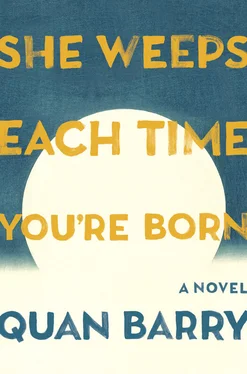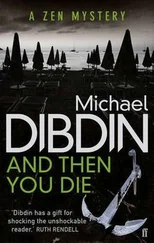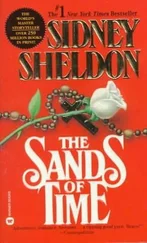Overhead Son searched the sky for the pale green second star in the Willow, his birth sign, but the moon was too bright. He knew even his uncles would be upset. Night with just a bamboo oar and no rope and him ferrying his childhood friend to the killing heart of the river. The worst part about it, his uncles would say as they sat drinking the ruou nep in the light of the fire, the sweet wine distilled from sticky rice, was that there was really nothing in it for him. He had a heart like his dead father, An, they would conclude — like An, he put everyone else ahead of himself.
After a while Son changed course again, steering the sampan the final stretch toward the Great Emptiness in the western sky. How to explain? Sometimes with Rabbit you chose to do things you wouldn’t ordinarily do. You became bigger than who you were. Wasn’t that what the Buddha taught? He didn’t think his uncles would understand. And with the government’s new policies in place, in a few short months everyone had forgotten how they used to live. Son could still remember the old way of harvesting rice, everyone out in their neighbor’s fields, everyone lending a hand, the whole village prospering together. And how at the end of the harvest the village would celebrate by hiring a water puppet troupe to perform, the papery creatures as if walking on the surface of the flooded paddies. Yes. The thing his uncles would chide him for was the thing he missed most about his father. When An was with you, he would do anything you needed — climb any tree, till any paddy, or just carry you on his thin shoulders even when you could have walked. Now that the government had collectivized the countryside, declaring everything belonged to everyone, it had had the opposite effect — it made the whole world less willing to be generous. Now nobody gave his neighbor a hand at harvest time. Each farmer was left to struggle on his own. Once Son had heard his uncle Hai say it was a good thing An was dead because this new world would’ve killed him.
Son steered the boat past a fisherman floating on a makeshift raft. The man’s fire had gone out. A fishing bird huddled at the man’s feet, but there was something strange about the creature. Son wondered if the bird’s wings were rotting. Unlike other seabirds, cormorants didn’t produce oil. Every day you had to let them out of their cages to stand in the sun, or their feathers would become waterlogged. With a wingspan of over four feet, if they stayed wet long enough, their soggy feathers could become heavy as weights, in time their own wings drowning them.
A match, the man said as the two children passed by, the man gesturing as if lighting a cigarette. It was more a command than a request. Son looked to Rabbit. Ever since the government had begun collectivizing the farms, robbery was on an uptick. Rabbit studied the man. His conical hat obscured his face, though she could see his long gray beard falling to his chest. He was leaning toward them, one hand invisible under the water. She shook her head. Son kept paddling. He could feel Binh’s feet tightening on his shoulder. He knew his father would’ve stopped to help.
Within minutes he could hear the shift in the current. He kept the boat near shore. Even then he had to throw all his weight into it, the speed of their progress cut in half. There was no way he could row them out into the middle. If he did, it would be like shooting a rapid, the water sending them sailing downstream in unpredictable ways. They were still a half mile from where the waters converged, but it was close enough. In the moonlight he could see things tornadoing past, mostly sticks and weeds but other objects as well, things bloated and shiny.
You sure about this, he said. Already she was picking the smaller bird off her wrist. Even if it comes up with all the Buddha’s gold, he said, who’s going to believe us? Rabbit glared. Son felt his face growing red. It was true. Nobody would question it. Adults believed every word she said.
He reached into the pocket of his shorts and pulled out a book of matches. Out here it was a formality. The light wouldn’t make a difference in the fast water. He walked to the front of the boat, the sampan rocking, and raked his fingers through the basket full of twigs and leaves they kept on board. With one match he got it lit.
It was the ancient art of fishing. After dark all over the Mekong, men in boats would position baskets of fire on long poles out over the water, the innumerable flames like a flock of moons, then up out of the depths shadows massed on the surface of the river, each one attracted to the light, moths to the flame, and splash! The bird dives over the edge into the darkness, thrashing about momentarily, and resurfaces only to be hauled up by the fisherman. And when he whistles, the bird opens its beak, and the man reaches in and pulls one out, the bond between man and bird sealed, the fish’s long silver body flashing in the firelight. At the end of the night, the horizon pinking, the fishermen load the birds back into their wicker cages, the men’s movements gentle, deferential, as if they were handling gods, each man placing a dark hood over the bird’s crested head and dousing the flame, putting the feathered god to sleep.
Son slid the basket of fire out over the side of the boat. Here the river was so fast the light wouldn’t attract anything other than insects, but he did it all the same.
Rabbit had her face buried in the bird’s feathers. She was talking to it with her eyes closed. Son couldn’t hear what she was saying. He knew her words were building a fire in the bird. He closed his eyes and tried to pretend. Someday he wanted someone to talk to him like that.
Rabbit perched the bird on the lip of the boat. The basket of fire swung over the water as the sampan rocked in the current. It was a narrow point in the river, less than a quarter mile from shore to shore, the water gray in the moonlight. The bird extended its snakelike neck as if limbering up, its dark grace mesmerizing.
Go. Rabbit’s command echoed inside Son’s head. He hadn’t even seen her lips move. The bird opened its black wings. He could see where the pattern had been interrupted by Huyen’s cleaver. Clipping could be tricky. Hit a blood feather and the animal could bleed to death.
The bird fluttered down onto the water. Already it was moving away, its powerful feet all but invisible. Son put his hand on Rabbit’s shoulder. It would all be decided under the surface. The bird would slip under, then the animal would have to call on both its feet and wings to power it back up against the crushing water. Once it dove, everything would happen quickly.
Thirty feet upstream there was a series of rocks studded in the river. The one time out with his uncles they had pulled to shore at the end of the day. Something was choking the engine. While they waited for Duc to clear it, Hai had climbed out on the nearest rock and lit a cigarette. Once Duc got the engine going they were ready to leave, but Hai was still lying on a rock, his shirt off as he lay sunning himself. Hey lady, Duc had called. Get over here or we’ll leave your flat ass. Now in the moonlight Son noticed the rocks strung across the river, each one silent and black.
A halo of insects was swarming around the fire. On his shoulder Binh’s feet were starting to make his skin sweat. He missed the exact moment when the bird went under. One minute its long loose neck swayed like an S, the next it was gone.
They waited. Far away downriver pinpricks of light twinkled, whole universes being born and falling dead. Then Son could see it, the great neck craning. He could see the fish in its mouth. Even at a distance the whiskers on the fish’s face were thick as wire. And of its own free will the bird was making straight for them with its offering, coming to lay the great fish at Rabbit’s feet.
Читать дальше












